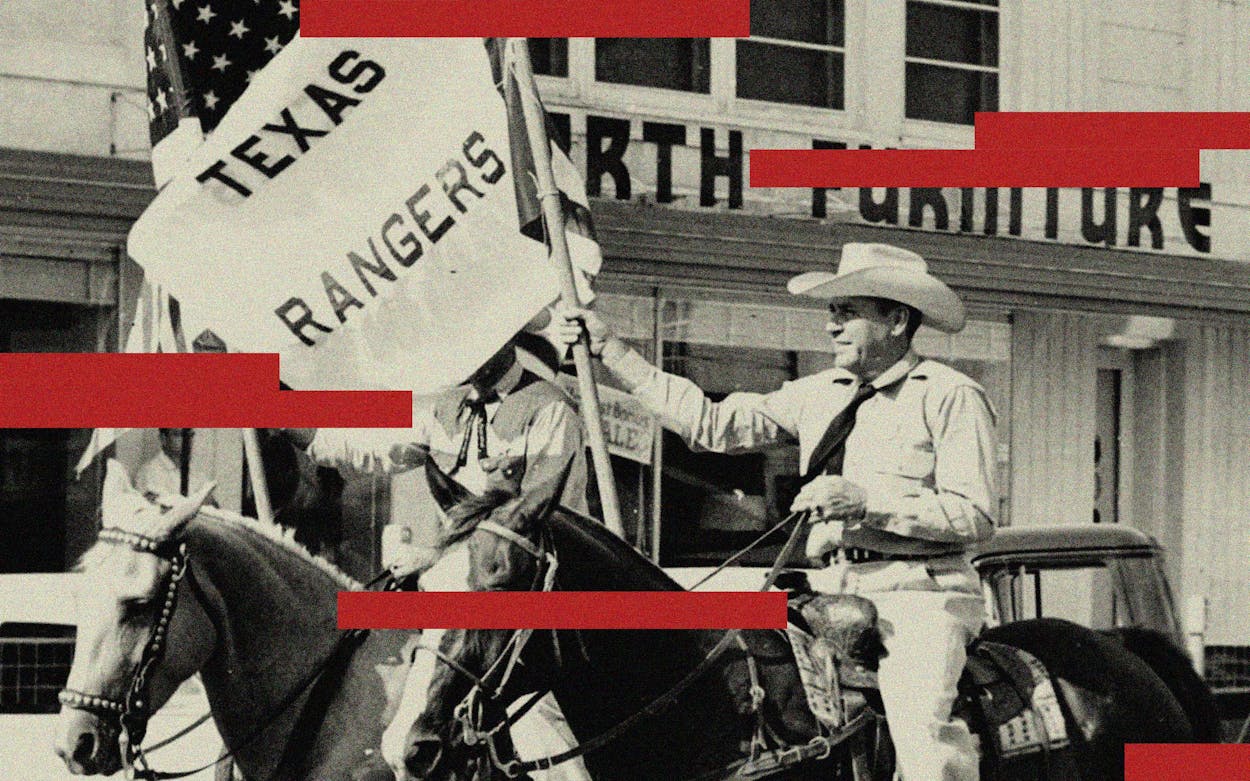In 2023, the Texas Rangers, Texas’s oldest law enforcement organization, will mark 200 years since its inception. Ten years ago, the Public Safety Commission, the civil oversight committee for the Department of Public Safety, organized Texas Ranger 2023 Inc. to “commemorate the 200 years of service the Texas Rangers have given the citizens and the State of Texas.” The year-long celebration begins at the Fort Worth Stock Show and Rodeo in January and continues monthly throughout the state, concluding with a fundraising gala in November in Austin. Events are aligned with honoring all six Ranger companies in their respective regions.
This planned year of celebration promotes a particular view of the Texas Rangers—200 years of the kind of unvarnished heroism we see in Hollywood portrayals. But since the commission established the bicentennial committee in 2013, more of the public has come face to face with a fuller picture of Rangers history, one that includes murder and other criminal acts of violence perpetrated by some of its members. Multiple books—such as Monica Muñoz Martinez’s The Injustice Never Leaves You and John Morán González’s and Sonia Hernández’s Reverberations of Racial Violence—along with a Bullock museum exhibit, public programming, state historical markers, and now Texas Monthly’s podcast White Hats have all since upended the one-sided Ranger mythology.
Given this, I believe the bicentennial of the Texas Rangers should be a time for reflection, not a celebration based on a whitewashed view of history. The planned events to celebrate the Rangers next year should align with the historical record and not overlook the tragic elements of the institution’s legacy.
Even the Department of Public Safety, of which the Texas Rangers has been a division sine 1935, has rejected the Rangers mythology. In a 2021 story examining La Matanza (“The Massacre”), the period between 1910 and 1920 where Rangers killed hundreds of Mexicans and Mexican Americans in the Rio Grande Valley, DPS released the following statement:
“No relationship exists between the modern Texas Rangers (or the Texas Department of Public Safety) and the incident you reference. The modern-day Texas Rangers are comprised of principled men and women of great skill and integrity who are fully committed to the rule of law. We would refer you to the Texas Ranger Hall of Fame Museum as a good source of accurate information on the history of the Texas Rangers.”
It should be noted that the 1935 incorporation of the Ranger force did not end its abuse of power related to violating due process, maintaining segregation, breaking strikes, and intimidating voters. A disconnect exists between the DPS admission of the historical reality and the nature of the planned celebrations. That disconnect exists in the larger public as well.
Refusing to Forget—a nonprofit public history project formed in 2014 by myself and John Morán González, Sonia Hernández, Benjamin Johnson, and Monica Muñoz Martinez—has been involved with efforts to present a more truthful history about the Rangers. The project’s stated purpose is to bring to light the history of state-sanctioned violence during the 1910s and remember the victims, their families, and descendants.
Texas Ranger 2023 Inc. should invite historians and other scholars that examine all aspects of Ranger history to present at planned events. Along with scholars, descendants and members of communities who have a history of dealing with state-sanctioned violence by Rangers should be invited to speak, and state archives should preserve their oral testimony.
It is time to address Ranger history thoroughly and honestly so the many wounds done to communities across Texas can finally be addressed. The failure to do so perpetuates the original injustice. Part of justice is the dignity of being remembered.
Trinidad Gonzales is a history and Mexican American studies instructor at South Texas College and cofounder of Refusing to Forget.






